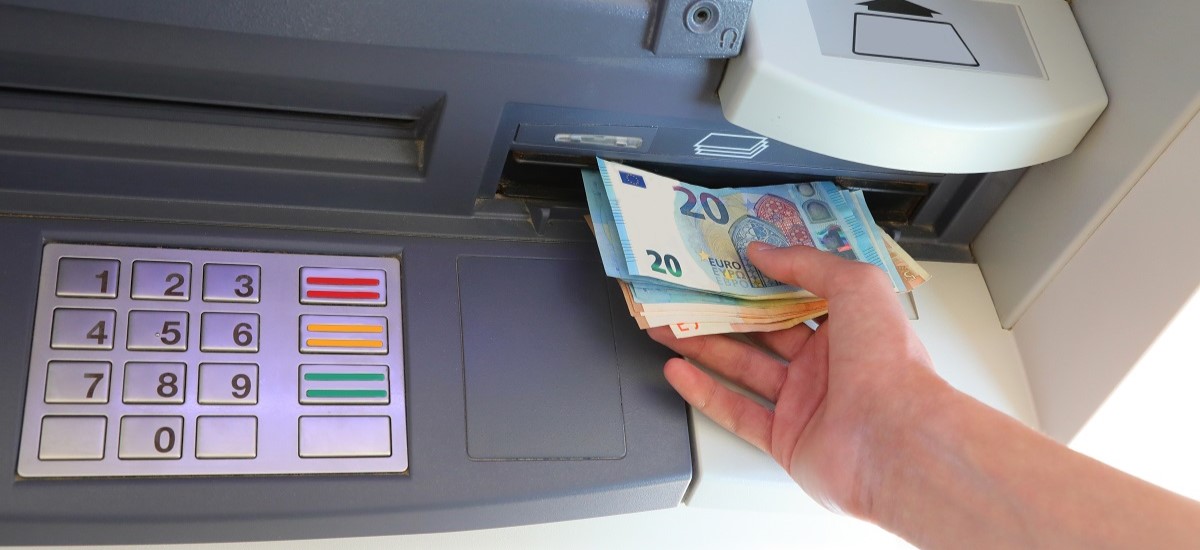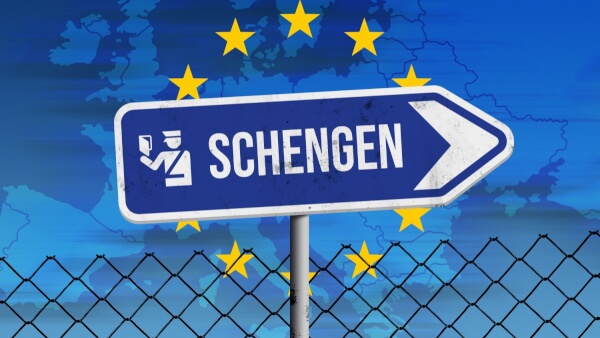How to apply for a German Schengen visa from the UK
Applying for a German Schengen visa from the UK? Read our complete guide covering required documents, fees, application steps, and advice.

Travelling to Germany from the UK? Whether you’re there for business or pleasure, one thing’s for sure - you needn’t worry about finding an ATM.
The International Monetary Fund (IMF) has estimated there are around 79 ATMs per 100,000 adults in Germany.1
But before you rush to the first one you see, read on to find out more about using ATMs in Germany. We’ve put together a handy guide to fees, exchange rates and max withdrawal limits, so you’ll know exactly what to expect.
And, if you want to avoid exchange rate markups and sneaky transaction fees while shopping in Germany, then check out the Wise card.
You can use it to spend and withdraw cash in 150+ countries, and your transactions abroad are automatically converted using the fair mid-market exchange rate.
ATMs in Germany are normally located inside or just outside bank branches. You’ll also find them at most major airports. They’re less common in places such as shopping malls and petrol stations.
Germany’s major banks have many ATMs, and they’ve made them easy to find with these online locators:
In Germany, ATMs are generally called Geldautomat or Bankautomat.
German ATMs accept foreign bank cards, as long as they belong to a compatible card service. Most accept Visa and Mastercard debit and credit cards, which are the most commonly issued cards in the UK.
This means you should be fine to use your UK-issued card in Germany. You’ll just need to check with your bank whether it has any charges for overseas transactions.
You can confirm if a German ATM is compatible with your card by checking whether your card network’s logo is on the machine. Alternatively, you can use one of these global ATM locators:
German ATMs accept both 6-digit and 4-digit PINs,2 so you should be able to use the PIN you usually use back in the UK.
ATMs, as well as most shops and merchants in the country, only accept chip and PIN cards. If yours doesn’t have a chip, it could be a good idea to change it before travelling.
How much you can withdraw at once (or per day) from ATMs overseas largely depends on the limits set by your home bank or card provider.
However, German ATMs do have some maximum cash withdrawal limits. This could be because there’s a limited amount of cash held in the machine, or for security reasons.
The limit varies between banks and their ATMs, ranging from €500 all the way up to €2,000 (approx. £422 to £1,689 GBP) per transaction. However, the good news is that there aren’t usually any limits on how many withdrawals you can make.2
These days, it’s not usually necessary to inform your bank that you’ll be using your debit card abroad.
But while it isn’t mandatory, you might want to do it anyway. There’s the smallest chance that your transactions in Germany could mistakenly be flagged as fraud with your bank’s security team. This could even lead to your card being blocked.

It could even be worth getting an alternative spending card, one that is specially designed for international travel.
The Wise card is the ideal travel companion, as it works in 150+ countries and lets you withdraw up to £200 a month (max. 2 withdrawals) from overseas ATMs without any fees*.
You’ll just need to check that the ATM operator doesn’t charge its own fees.
Choose to withdraw in the local currency and your Wise card will do the currency conversion at the mid-market exchange rate with only a small conversion fee*.
This means no expensive mark-ups eating into your spending money.
So, how much will it actually cost you to use ATMs in Germany? There are three types of fees you need to consider:
We’ll look at all of these in more detail here, so you can calculate the true cost of using ATMs during your trip.
When you use an ATM abroad, you’ll usually see a screen asking if you want the transaction to be carried out in British pounds (GBP) or the local currency. In this case, it’ll be euros (EUR).
While it may seem logical to choose GBP, this would be a mistake. You should always choose to withdraw in the local currency (EUR) without conversion. Decline the conversion, and it’ll be carried out by your bank or card provider instead. They’ll give you a better rate.
Otherwise, the ATM will apply its own exchange rate using something called Dynamic Currency Conversion (DCC).
These rates are nearly always poor, meaning that the withdrawal costs you more - and you’ll have less spending money for your trip.
So the bottom line is - always press ‘no’ when asked about currency conversion at an overseas ATM.
Some UK banks charge fees for foreign transactions, which includes cash withdrawals. So always check before you travel, either by contacting your bank or reading the terms and conditions for your account.
Germany’s major banks including Deutsche Bank, Commerzbank, HypoVereinsbank and Postbankare part of Cash Group. This is a cooperative venture that waives ATM fees, but only for existing customers with a German bank account.
This means that as a foreigner, you may have to pay ATM fees in Germany. These range from €0 to €7.50,2 so you may need to ‘shop around’ to find a cheap or fee-free option.
Privately operated ATMs may also charge high fees.
You can distinguish private machines from bank ATMs because they don’t have a bank’s name and branding.
Instead, they’ll have names such as Euronet or Travelex. The machine will also warn you that you’ll be charged a fee (and the amount) before you complete the transaction.
It may be possible to find a fee-free ATM in Germany, but you might need to try a few. It’s best to focus on ATMs operated by major banks, as privately owned cash machines are likely to charge fees.
There is another way you can potentially get free cash withdrawals in Germany. Many German banks have partnerships with banks in other countries. For example, Deutsche Bank partners with Barclays Bank.3
If you’re a customer at one of these partner banks in the UK, you might be able to get fee-free ATM withdrawals in Germany. Just look out for ATMs operated by that bank.

Some ATMs may offer you a ‘service’ of being charged in your local currency (i.e. GBP). It’s always best to decline this option, choosing instead to be charged in EUR.
This helps you avoid hidden ATM rip-offs by giving you the best possible exchange rate.
Check the latest GBP - EUR conversion rate below:
ATMs at airports tend to be very expensive, charging high fees for withdrawing money or converting currency. So even though they may be convenient, they’re best avoided unless you have no other option.
If your UK bank has an overseas ATM network or partners with banks in Germany, you may be able to benefit from low or no fees on ATM withdrawals. It’s always worth finding out before you travel.
Some UK banks don’t charge fees for spending and withdrawing cash overseas. If yours does have these fees, it could be worth switching banks and getting a fee-free card.
And this is really important - unless it’s unavoidable, you should never use a credit card to make ATM withdrawals, either at home or abroad.
Withdrawing cash with a credit card is usually a lot more expensive than using a debit card. This is because nearly all credit cards charge fees for cash transactions. There’s also the drawback that interest will likely start accruing right away, so you won’t benefit from your usual interest-free period.
If you travel regularly, the Wise card is the perfect way to spend and withdraw cash worldwide.
It’s a dedicated travel card, letting you spend like a local in 150+ countries worldwide. It automatically converts your pounds to the local currency at the mid-market exchange ratewhenever you spend for only a small, transparent fee*.
And when you need cash, you can use it to withdraw up to £200 a month (max. 2 withdrawals) fee-free*.
You’ll just need to check whether the ATM operator charges its own fees.
Wise only ever charges small, transparent fees for currency conversion, and it’s fee-free if you already have the currency in your Wise account*.
Sign up for a Wise account online and you can get your own Wise card for a one-time fee of just £7.
Yes, German ATMs accept both Visa and Mastercard, which are the most commonly issued cards in the UK.
It’s a good idea to take a mix of cash and card to Germany for your trip. While cards are widely accepted, some shops have a €20 minimum spend limit2 - so you may need cash for smaller purchases. In some places, cash is also preferred (or cards simply aren’t accepted).
To avoid ATM fees, look for fee-free ATMs, including banks which partner with your home bank in the UK. They may offer low or no fees for cash withdrawals. You should also choose for the transaction to be carried out in the local currency, without currency conversion.
Euronet ATMs do tend to charge a fee for cash withdrawals, although the amount may vary depending on the location. If there is a fee, it’ll usually be displayed on the ATM screen just before you confirm the transaction.
Yes, the Wise card works in 150+ countries worldwide, including Germany so you can spend like a local for only a small, transparent fee*.
Sources used:
Sources last checked on date: 08-July-2024
*Please see terms of use and product availability for your region or visit Wise fees and pricing for the most up to date pricing and fee information.
This publication is provided for general information purposes and does not constitute legal, tax or other professional advice from Wise Payments Limited or its subsidiaries and its affiliates, and it is not intended as a substitute for obtaining advice from a financial advisor or any other professional.
We make no representations, warranties or guarantees, whether expressed or implied, that the content in the publication is accurate, complete or up to date.

Applying for a German Schengen visa from the UK? Read our complete guide covering required documents, fees, application steps, and advice.

Everything you need to know about money, banks and currency in Germany, plus info on cards and currency exchange.

What’s the best way to buy train tickets in Germany? A handy guide including step-by-step instructions and FAQs.

Check out our handy guide to using PayPal in Germany, including what fees you can expect.

Should you pay with cash or card in Germany? A handy guide including cash etiquette, German ATMs and using your UK card.

This guide will provide an overview of tax-free shopping in Germany so you can receive your VAT refund in cities like Munich and Berlin and save money.